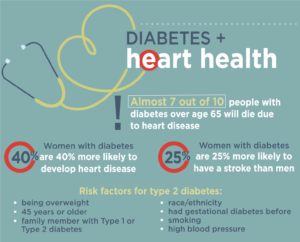 Porothea was 46 years old and living with diabetes when she had a heart attack and stroke. Today she balances being a grandmother and health care worker with managing diabetes and heart failure. She’s also a WomenHeart Champion and encourages other women to know their risk factors and take charge of their heart health.
Porothea was 46 years old and living with diabetes when she had a heart attack and stroke. Today she balances being a grandmother and health care worker with managing diabetes and heart failure. She’s also a WomenHeart Champion and encourages other women to know their risk factors and take charge of their heart health.
While everyone living with type 2 diabetes is at higher risk for developing heart disease, women with diabetes are two times more likely than men with diabetes to develop heart disease. They are also more likely to experience adverse health outcomes such as fatal heart attacks. This gender disparity is compounded for women who are African American, Latina, American Indian/Alaska Native, or Asian/Pacific Islander because they are more likely than white women to have diabetes. Therefore, it is crucial to know your risk level and be proactive about protecting your heart health.
There are multiple factors contributing to the disparity in risk for heart disease for women – and particularly women of color – living with diabetes. For many, financial instability and lack of health insurance create a barrier to accessing health care, including preventive care. Racial and implicit bias among health care professionals can lead to issues of mistrust or a missed diagnosis that compromise quality care. And while regular checkups are an important part of diabetes management, studies suggest that women may be treated less aggressively than men when it comes to cholesterol-lowering drugs and other preventive treatment.
All women should receive health care that is respectful, culturally competent, safe and of the highest quality. Public policies that address disparities in access to and quality of care, systemic racism, bias in health care systems and structural barriers to health equity are crucial.
 On a personal level, women with diabetes can reduce their risk for heart disease with these steps:
On a personal level, women with diabetes can reduce their risk for heart disease with these steps:
- Know your numbers – Blood pressure, A1C, cholesterol and kidney function
- Exercise regularly
- Eat a heart-healthy diet
- Quit smoking
- Talk to your doctor about how to mitigate your risk for heart disease
Reducing your risk for heart for heart disease by managing your diabetes may seem like a challenge, therefore regular communication and check-ups with your health care provider are key. It is important that you trust your doctor or nurse practitioner and that they understand the role of gender, race and ethnicity when it comes to your care.
WomenHeart is here to support you along your journey to heart health. You can also find resources such as tips and recipes at Know Diabetes by Heart.



